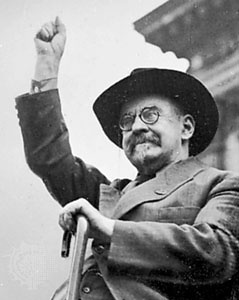Vandervelde, Émile
Belgian statesman
born Jan. 25, 1866, Ixelles, Belg.
died Dec. 27, 1938, Brussels
 Belgian statesman and a prominent figure in European socialism who served in Belgian coalition governments from 1914 to 1937 and was influential in the peace negotiations following World War I.
Belgian statesman and a prominent figure in European socialism who served in Belgian coalition governments from 1914 to 1937 and was influential in the peace negotiations following World War I.Vandervelde joined the Belgian Workers' Party in 1889 and became a party leader. He entered parliament as a Socialist in 1894 and played a leading role in the Second International (International, Second) congresses after 1900. In the years before World War I he was prominent in the Socialist agitation for universal suffrage, granted in Belgium in 1919. He was named minister of state in 1914 and served in the cabinet during the war. In the Paris Peace Conference treaty negotiations (1919–20), he gained inclusion of clauses favouring labour, including one advocating an eight-hour day; as minister of justice, he sponsored major penal reforms (1919).
After the gains of the Workers' Party in the elections of 1925, he was named minister for foreign affairs in a Socialist–Catholic coalition government and helped negotiate the Pact of Locarno (1925) among Germany, Belgium, France, Great Britain, and Italy. He continued as foreign affairs minister in the first two years of Henri Jaspar's ministry but was criticized by opposition parties for advocating limitation of military service to six months and for his antimilitarist stance in foreign policy. He served as minister without portfolio (1935–36) and minister of public health (1936–37) before retiring to become a law professor at the Free University of Brussels.
Vandervelde's works include Le Collectivisme et l'évolution industrielle (1900; Collectivism and Industrial Evolution, 1907); Le Socialisme contre l'état (1918; Socialism Versus the State, 1919); and Le Parti Ouvrier Belge, 1885–1925 (1925; “The Belgian Workers' Party, 1885–1925”).
- Māra
- Māturīdī, Abū Manṣūr Muḥammad al-
- Māturīdīyah
- Māwardī, al-
- Māzandarān
- Mēness
- Mīkāl
- Mīr Dāmād
- Mīr Jaʿfar
- Mīrkhwānd
- Mīrpur Khās
- Mīr Sayyid ʿAli
- Mīrzā Asadullāh Khān Ghālib
- Mīrzā Taqī Khān
- Mīrzā Yaḥyā Ṣobḥ-e Azal
- Mīrā Bāī
- Mīr ʿAlī of Tabriz
- Mōri Family
- Mūlamadhyamakakārikā
- Mūsawī, ʿAbbās al-
- Mūsā
- MʾSila
- Mʾzab
- Mʾzabite
- Naas